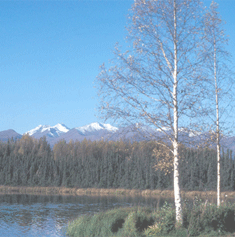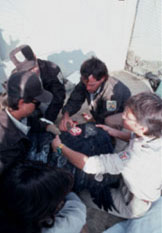|
Strategic Habitat Conservation Peer Review of Scientific Information
|
Welcome
This site will maintain information on implementation of the Science Excellence and related matters. ____________________________ Director’s Message to U.S. Fish and Wildlife Service Employees
- 1/30/2008 When I came onboard as Director, I emphasized that science is the underlying foundation for all of our work, priorities and decisions, and provided to everyone my thoughts on how the Service uses science to achieve its mission. To help define what we want to be known for, the Service Directorate identified a set of conservation principles, which were sent out to everyone in the Service for comment. Seven Conservation Principles were finalized in 2007; three of these—Science, Service, and Professionalism—form the foundation of our work and shape our relationships with each other, our partners and the public we serve. I am pleased to sign the Scientific Code of Professional Conduct for the Service, which was developed by the Service’s Science Committee. This code constitutes a series of guidelines applicable to scientists, managers and executives within our organization—including the Director. It applies to scientific conduct, but also extends to the translation and application of science used to inform resource management decisions. The Service code is modeled upon other codes from professional organizations like The Wildlife Society and American Fisheries Society and these organizations have praised our effort as an important ingredient of organizational integrity. As you read this document, first and foremost, I want you to know that I have the highest confidence in your scientific integrity and abilities. I am reminded of the dedication and professionalism you display every day, and this code should be viewed as reflection and reinforcement of your day-to-day actions. While it addresses misconduct, the policy focuses to a greater degree on continued scientific excellence, provides clear expectations for employees, and creates an environment where such expectations will be met. The code complements the Service’s commitment to professional development and workforce planning, and reminds managers that supporting employees in publishing scientific work, reviewing the work of others, and being members and leaders of scientific societies is a central ingredient in organizational strength and integrity, and so, in achieving our mission. The code establishes uniform policies for all Service employees to follow as they conduct and manage scientific activities, with the utmost regard for maintaining and enhancing the Service’s reputation for professionalism, integrity and objectivity. It is a blueprint designed to help us:
The code provides clear guidance that will support employees and managers in their pursuit of sound science and help the Service maintain open and robust ties with the greater scientific community. I believe it reflects our traditional commitment to individual and organizational integrity, but it also reinforces the high standard for public service to which we all aspire. Please take the time to read the code and keep it in mind as you work to conserve and protect our nation’s fish and wildlife resources for future generations. Thank you for your continued dedication to the mission of the Fish and Wildlife Service. U.S. Fish and Wildlife Service Scientific Code of Professional Conduct News Bulletin Announcing Scientific Code of Professional Conduct The Service code has been praised by leading societies for fish and wildlife scientists:
|
Last updated:
October 6, 2008

 The
goal of the Service's Science Excellence is to strengthen the Service's tradition of scientific excellence in the conservation of fish, wildlife, plants and their habitat. We will accomplish this by:
The
goal of the Service's Science Excellence is to strengthen the Service's tradition of scientific excellence in the conservation of fish, wildlife, plants and their habitat. We will accomplish this by: "The
American Fisheries Society includes many U.S. Fish and Wildlife Service
employees among its members and has long believed that a strong code
of professional conduct is an important aspect of organizational integrity.
This new Service policy reflects that same commitment, and we applaud
the Service for taking this step which is closely commensurate with the
code of conduct that the American Fisheries Society has long espoused."
– Dr. Gus Rassam, Executive Director, American Fisheries Society.
"The
American Fisheries Society includes many U.S. Fish and Wildlife Service
employees among its members and has long believed that a strong code
of professional conduct is an important aspect of organizational integrity.
This new Service policy reflects that same commitment, and we applaud
the Service for taking this step which is closely commensurate with the
code of conduct that the American Fisheries Society has long espoused."
– Dr. Gus Rassam, Executive Director, American Fisheries Society.